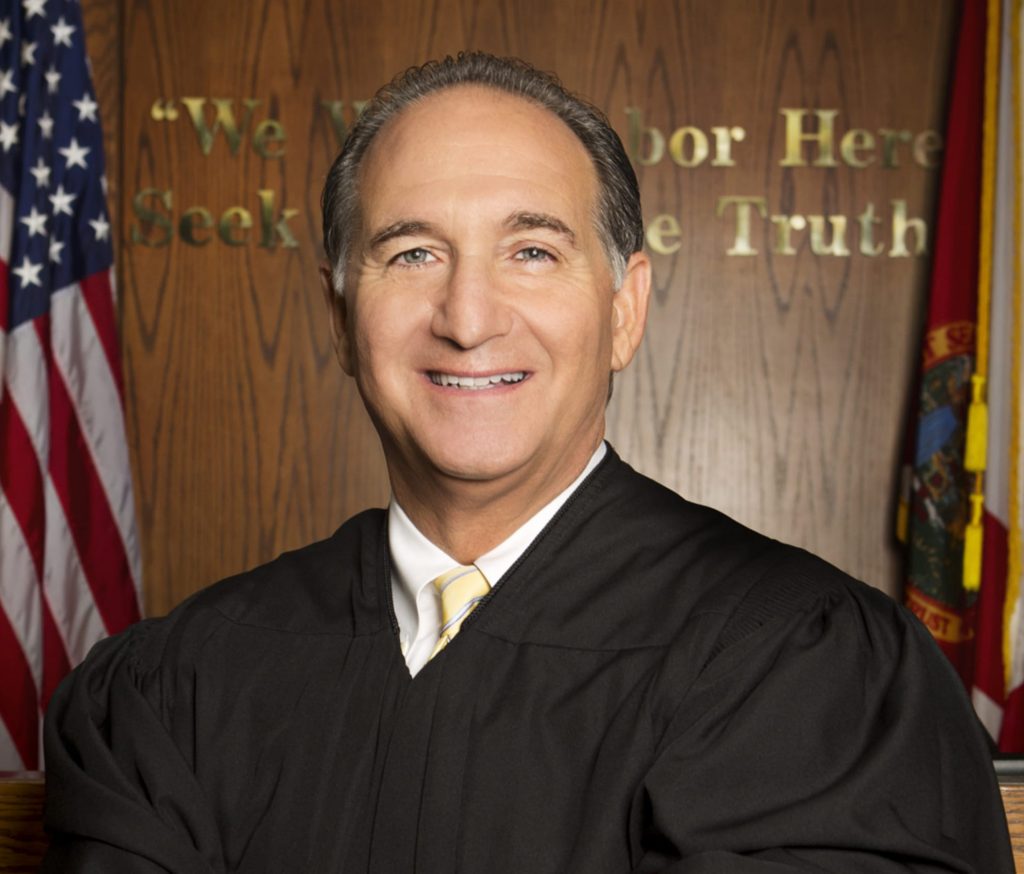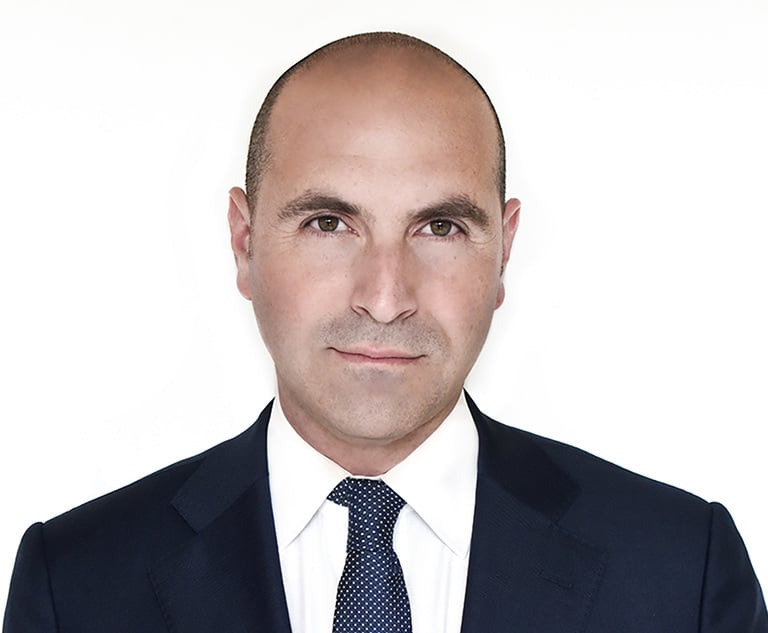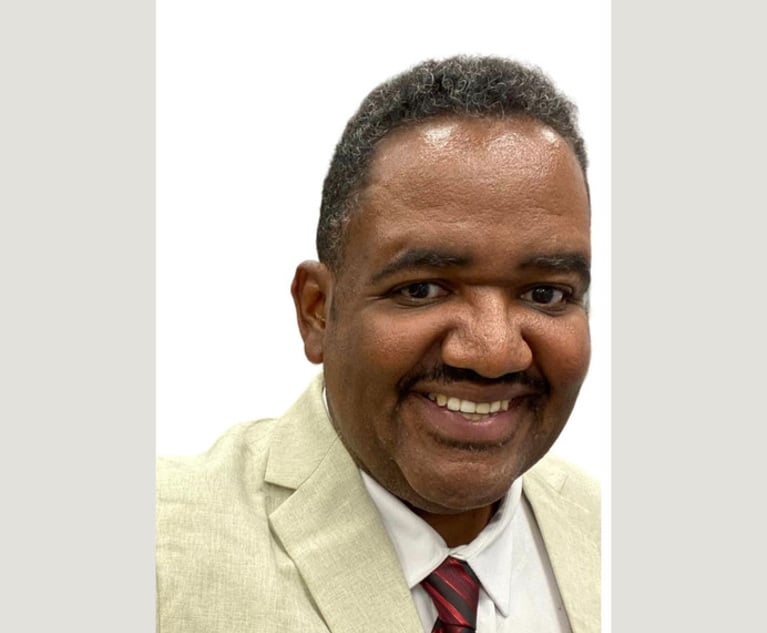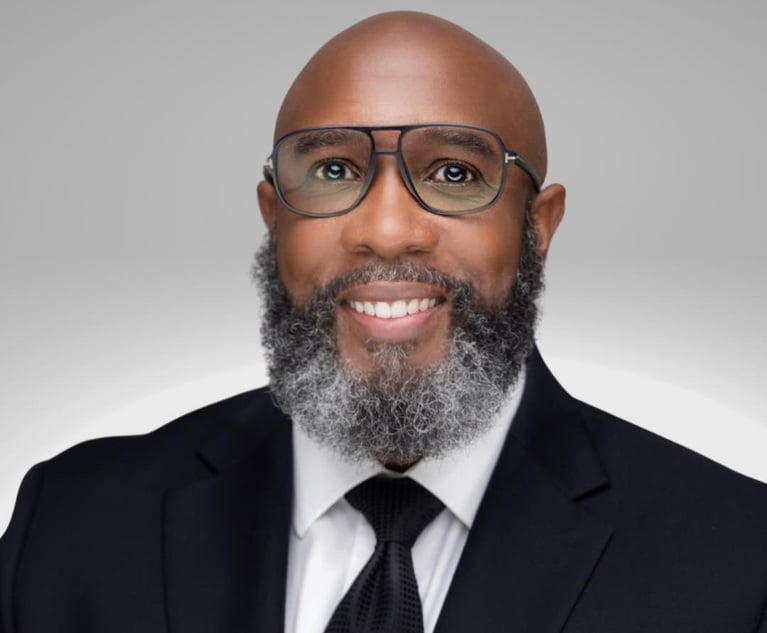Judge Steven Leifman Leads the Way in Decriminalizing Mental Illness
Leifman has made Miami-Dade County a nationwide example of the positive changes that mental health care reform can bring, both within the courtroom and outside it.
November 16, 2018 at 02:04 PM
6 minute read
 Miami-Dade Circuit Judge Steven Leifman. Photo by Stian Roenning
Miami-Dade Circuit Judge Steven Leifman. Photo by Stian Roenning
When Miami-Dade Circuit Judge Steven Leifman speaks out, people listen. A cursory search of him online will show him quoted in a variety of publications ranging from the local, including the Miami Herald and Miami New Times, to the national such as the Huffington Post, USA Today, POLITICO and more.
All of this attention has kept Leifman constantly on the move. When the DBR caught up with him on an early November afternoon, he had recently returned from New York City to accept the Pardes Humanitarian Prize in Mental Health, an award bestowed on those who've helped to advance how mental health and addiction issues are treated in the public sphere.
As a man in high demand, he was already slated to set back on the road the following day.
“Unfortunately, one of the byproducts of this success is everyone now wants to do it overnight,” he quipped to the Daily Business Review. Although he notes “traveling way too much,” Leifman has set a nationwide example for reforming mental health treatment within the criminal justice system. In his work as a judge and advocate for mental health care, he has positioned Miami as a leader in decriminalizing and destigmatizing mental illness.
The judge's concern for matters of mental health began decades earlier during an internship with a Florida state senator. After the editor of the Miami Herald contacted the office with concerns over the South Florida State Hospital in Broward County, Leifman was sent to investigate.
The conditions he saw shook him to his core.
“I found these seven men lying naked in a cell lying in their own feces while a guard stood there with a hose washing them down,” Leifman recounted. “And the only thing I could think of at the moment was 'Oh My God, we treat animals in the zoo better than this.' ”
He was particularly affected by the sight of one young man who was in all four-point restraints, screaming and visibly “ in his own personal hell.”
After learning that the patient was autistic as opposed to psychotic, Leifman was able to help secure his release. However, he couldn't do the same for the other men who'd imprinted themselves on the future judge's mind. “I grew up in a nice middle-class family and I'd never seen anything bad in my life,” he said. “It was pretty staggering and pretty disturbing.”
On Leifman's appointment to the bench, history began repeating itself with alarming frequency.
“The same horrors that I saw at that state hospital I began to witness in our own jail here in Miami-Dade,” he said.
The judge remembers an instance in 2000 when one defendant, a Harvard-educated psychiatrist who had a late onset of schizophrenia, had a “full-blown psychotic episode” in his courtroom.
“He was screaming at the top of his lungs that his parents who were in the courtroom had died in the Holocaust and the people in the courtroom really were from the CIA and had come to kill him,” he recalled. “I ordered a battery of psychological evaluations because that was the only thing I'd been told we needed to do … only to have him adjudicated incompetent to stand trial, meeting criteria for involuntary hospitalization, and finding out that I had absolutely no legal authority to involuntarily hospitalize him anywhere. … I basically had to release him back to the street, floridly psychotic, after I had promised his parents with the lawyers that I would get their son help.”
Now catalyzed to conduct further research, the veil had been lifted for the judge on “what a horrible, ridiculous situation” existed in Miami-Dade.
“We have the largest percentage of people with serious mental illnesses of any urban area in the United States,” Leifman said. “Because Florida is 49th per capita in mental health funding, very few of these individuals were getting access to care and many, many were ending up in the criminal justice system with … nonviolent-type offenses.”
Since then, Leifman's resolve to bring Miami-Dade's mental health treatment in line with modern science has not only improved conditions for the mentally ill in the criminal justice system, but made the county an example for impactful reform across the country. With initiatives such as the Criminal Mental Health Project, Leifman has helped Miami-Dade assemble the resources to reduce arrests and recidivism in addition to providing mental health care more effectively.
It helps that he has the numbers to back him up.
“We keep data on every single mental health call to the city of Miami and Miami-Dade police departments,” Leifman said. “Those two agencies combined handled 83,427 mental health calls” between 2010 and 2017. “But more remarkably, they only made 149 arrests. Our jail number of arrests, as a result of the program, were reduced from 118,000 arrests a year in Miami-Dade to 56,000; our jail audit dropped from about 7,300 to about 4,000. It allowed us to close one of the three main jails in Dade County, [providing] savings of $12 million dollars a year. [The] building's been closed for about six years now, so that's about a $72 million dollar saving.”
Looking ahead, Leifman is eager about his work on establishing a “one-stop shop” for the most acutely ill in Miami. The facility will be geared toward offering both treatment and societal reintegration through occupational training.
With several projects underway, such as a national initiative called Stepping Up, Leifman shows few signs of slowing.
“I think when you give more than you're looking to get — and you're actually able to make this kind of contribution — it's incredibly rewarding,” he said. “I don't think there is any greater reward in justice than to see somebody come back in recovery, stopping that cycle and letting them get their lives back.”
Judge Steve Leifman Born: 1958, Miami Spouse: Osi Rind Children: Max Education: Florida State University, J.D., 1986; American University, B.S., 1981 Experience: Associate Administrative Judge, Miami-Dade County Court-Criminal Division, 1998-present; Miami-Dade County Court Judge, 1995-1997; Chairman, Steering Committee on Problem Solving Courts, Florida Supreme Court, 2018-present; Chairman, Task Force on Substance Abuse and Mental Health Issues in the Court, Florida Supreme Court, 2010-2018; Special Adviser on Criminal Justice and Mental Health, Florida Supreme Court, 2007-2010; Pardes Humanitarian Prize in Mental Health, 2018; Governing Magazine Public Official of the Year, 2016; Florida Supreme Court Chief Justice Award for Judicial Excellence, 2015; William H. Rehnquist Award for Judicial Excellence, 2015
This content has been archived. It is available through our partners, LexisNexis® and Bloomberg Law.
To view this content, please continue to their sites.
Not a Lexis Subscriber?
Subscribe Now
Not a Bloomberg Law Subscriber?
Subscribe Now
NOT FOR REPRINT
© 2025 ALM Global, LLC, All Rights Reserved. Request academic re-use from www.copyright.com. All other uses, submit a request to [email protected]. For more information visit Asset & Logo Licensing.
You Might Like
View All
Growing Referral Network, Alternative Fees Have This Ex-Big Law’s Atty’s Bankruptcy Practice Soaring
5 minute read
Against the Odds: Voters Elect Woody Clermont to the Broward Judicial Bench
4 minute read
Miami Civil Judge Myriam Lehr to Say Goodbye to the County Court Bench
4 minute readTrending Stories
- 1Uber Files RICO Suit Against Plaintiff-Side Firms Alleging Fraudulent Injury Claims
- 2The Law Firm Disrupted: Scrutinizing the Elephant More Than the Mouse
- 3Inherent Diminished Value Damages Unavailable to 3rd-Party Claimants, Court Says
- 4Pa. Defense Firm Sued by Client Over Ex-Eagles Player's $43.5M Med Mal Win
- 5Losses Mount at Morris Manning, but Departing Ex-Chair Stays Bullish About His Old Firm's Future
Who Got The Work
J. Brugh Lower of Gibbons has entered an appearance for industrial equipment supplier Devco Corporation in a pending trademark infringement lawsuit. The suit, accusing the defendant of selling knock-off Graco products, was filed Dec. 18 in New Jersey District Court by Rivkin Radler on behalf of Graco Inc. and Graco Minnesota. The case, assigned to U.S. District Judge Zahid N. Quraishi, is 3:24-cv-11294, Graco Inc. et al v. Devco Corporation.
Who Got The Work
Rebecca Maller-Stein and Kent A. Yalowitz of Arnold & Porter Kaye Scholer have entered their appearances for Hanaco Venture Capital and its executives, Lior Prosor and David Frankel, in a pending securities lawsuit. The action, filed on Dec. 24 in New York Southern District Court by Zell, Aron & Co. on behalf of Goldeneye Advisors, accuses the defendants of negligently and fraudulently managing the plaintiff's $1 million investment. The case, assigned to U.S. District Judge Vernon S. Broderick, is 1:24-cv-09918, Goldeneye Advisors, LLC v. Hanaco Venture Capital, Ltd. et al.
Who Got The Work
Attorneys from A&O Shearman has stepped in as defense counsel for Toronto-Dominion Bank and other defendants in a pending securities class action. The suit, filed Dec. 11 in New York Southern District Court by Bleichmar Fonti & Auld, accuses the defendants of concealing the bank's 'pervasive' deficiencies in regards to its compliance with the Bank Secrecy Act and the quality of its anti-money laundering controls. The case, assigned to U.S. District Judge Arun Subramanian, is 1:24-cv-09445, Gonzalez v. The Toronto-Dominion Bank et al.
Who Got The Work
Crown Castle International, a Pennsylvania company providing shared communications infrastructure, has turned to Luke D. Wolf of Gordon Rees Scully Mansukhani to fend off a pending breach-of-contract lawsuit. The court action, filed Nov. 25 in Michigan Eastern District Court by Hooper Hathaway PC on behalf of The Town Residences LLC, accuses Crown Castle of failing to transfer approximately $30,000 in utility payments from T-Mobile in breach of a roof-top lease and assignment agreement. The case, assigned to U.S. District Judge Susan K. Declercq, is 2:24-cv-13131, The Town Residences LLC v. T-Mobile US, Inc. et al.
Who Got The Work
Wilfred P. Coronato and Daniel M. Schwartz of McCarter & English have stepped in as defense counsel to Electrolux Home Products Inc. in a pending product liability lawsuit. The court action, filed Nov. 26 in New York Eastern District Court by Poulos Lopiccolo PC and Nagel Rice LLP on behalf of David Stern, alleges that the defendant's refrigerators’ drawers and shelving repeatedly break and fall apart within months after purchase. The case, assigned to U.S. District Judge Joan M. Azrack, is 2:24-cv-08204, Stern v. Electrolux Home Products, Inc.
Featured Firms
Law Offices of Gary Martin Hays & Associates, P.C.
(470) 294-1674
Law Offices of Mark E. Salomone
(857) 444-6468
Smith & Hassler
(713) 739-1250







